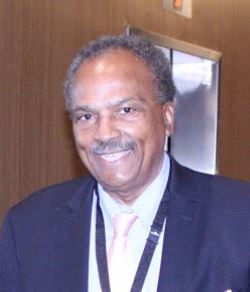Tell us a bit about your professional background.

I have worked at Advocacy since 1998 on procurement issues. I have served as the Acting Chief Counsel in the Office of Advocacy since January 2017. Later, in November 2021, I took over as Deputy Chief Counsel. Before my time at Advocacy, I was the Executive Vice President of Corporate Development and Administration at the MAXIMA Corporation for eleven years. I was also the former Chief of Staff and Senior Administrative Officer of the U.S. House of Representatives Committee on Small Business.
I earned my Juris Doctor and Master of Urban Planning from the University of Iowa and a Bachelor of Science in Political Science at North Carolina Agricultural and Technical University. I have also served as a professor in the Graduate Urban Planning program at Morgan State University. Currently, I am an adjunct professor in the Graduate Management program at the University of Maryland Global Campus and a certified Executive Coach with the International Coaching Federation and Howard University Coaching Diversity.
What regulatory issues do you work on at Advocacy?
I work on federal procurement and acquisition policy issues, international trade agreements, Small Business Innovation Research program issues, and both foreign and domestic cybersecurity policy.
What do you enjoy most about working on these issues?
All these areas are complex, and they require complex solutions that multiple different stakeholders have to agree to. Many of the issues in my area have not had a high level of small business input. I enjoy bringing the concerns of small businesses to the forefront of solutions.
What small business success are you most proud of?
At Advocacy, I have had many success stories but the one that I still cherish is the change to the Federal Acquisition Regulation dealing with contract retainage. This provision allowed federal agencies to withhold final contract payments to small businesses. We changed the language from a “shall” to a “may” which resulted in millions of dollars being released to small businesses.
When I was Chief of Staff of the House Small Business Committee, we were instrumental in passing major small business legislation like the Prompt Payment Act and the creation of SBA’s Secondary Market program of SBA Loans and revisions to the 8(a) SBA procurement program. So I’ve also made an impact outside of Advocacy.
If you could give one piece of advice to a small business owner concerned about regulation, what would it be?
Too frequently I hear small businesses say they are afraid to comment on regulations because of the fear of being “blackballed” for federal work or retaliated against.
Federal agencies are eager to learn from small businesses the impact of a potential regulation. Small businesses can comment directly on proposed regulations, or they can contact the Office of Advocacy and share their information on potential impacts. Please keep in mind that some proposed regulations can have a detrimental impact on your business. Our role in Advocacy is to be your advocate before federal agencies to ensure that these impacts do not happen. We can only do that with your support.
